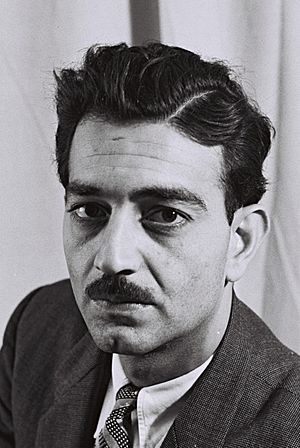Emile Habibi facts for kids
Quick facts for kids
Emile Habibi
|
|
|---|---|
 |
|
| Faction represented in the Knesset | |
| 1951–1959 | Maki |
| 1961–1965 | Maki |
| 1965–1972 | Rakah |
| Personal details | |
| Born | 28 January 1922 Haifa, Mandatory Palestine |
| Died | 2 May 1996 (aged 74) Nazareth, Israel |
Emile Shukri Habibi (Arabic: إميل حبيبي, Hebrew: אמיל חביבי, 28 January 1922 – 2 May 1996) was an important writer and politician. He was from Palestine and later became an Israeli citizen. He wrote many famous books in Arabic. He also served in the Knesset, which is like Israel's parliament, representing communist parties.
Contents
About Emile Habibi's Life
Emile Habibi was born in Haifa on January 28, 1922. At that time, Haifa was part of Mandatory Palestine, which was controlled by Britain. His family was Palestinian Arab and belonged to the Anglican Christian faith.
In his younger years, Habibi worked at an oil refinery. He also worked as a radio announcer. These experiences helped him understand different parts of society.
Becoming an Israeli Citizen
Habibi became a leader in the Palestine Communist Party during the time of the British Mandate. When the 1948 Arab-Israeli War started, he chose to stay in Haifa. After the war, he became an Israeli citizen.
He then helped create the Communist Party of Israel. He also started a communist newspaper called Al-Ittihad. This newspaper was important for sharing communist ideas.
Later Life and Legacy
In 1956, Habibi moved from Haifa to Nazareth. He lived there for the rest of his life. He passed away in 1996 in Nazareth. However, he had a special wish in his will. He wanted to be buried in his beloved hometown of Haifa. His tombstone was to say, "remained in Haifa." This phrase showed his deep connection to his home.
Emile Habibi's Political Work
Emile Habibi was a key figure in the Palestine Communist Party. This was during the time when Britain governed Palestine. He supported the 1947 UN Partition Plan. This plan suggested dividing Palestine into Arab and Jewish states.
Serving in the Knesset
After Israel became a state, Habibi helped form the Israeli Communist Party, known as Maki. He was elected to the Knesset, Israel's parliament. He served there from 1951 to 1959. He was elected again from 1961 until 1972.
Later, he and some friends, Tawfik Toubi and Meir Vilner, left Maki. They started a new party called Rakah. In 1991, he left Rakah after disagreements about new political ideas.
Emile Habibi's Writing Career
Emile Habibi became one of the most popular writers in the Middle East. His stories often showed the challenges faced by Palestinians living in Israel. These characters felt torn between different loyalties.
Exploring Life in Israel
His most famous novel is Strange Events in the Disappearance of Said Abu al-Nahs al-Mutashael (1974). This book explored the lives of Arabs who, like him, stayed in their homeland during the 1948-49 Arab-Israeli war.
Habibi started writing short stories in the 1950s. His first story, The Mandelbaum Gate, came out in 1954. He took a break from writing fiction until the late 1960s.
His Most Famous Novel
In 1972, he left the Knesset to focus on writing. He wrote his first novel, The Secret Life of Saeed the Pessoptimist. This book became a classic in modern Arabic literature.
The story uses black humor and satire to show the life of a Palestinian. It is based on a traditional Arab anti-hero character named Said. The book playfully explores what it is like for Arabs to live in Israel. It also shows how someone not interested in politics can get pulled into it.
He wrote other books, short stories, and a play after this success. His last novel, Saraya, the Ogre's Daughter, was published in 1992. In this book, one character says, "There is no difference between Christian and Muslim: we are all Palestinian in our predicament." This quote shows his belief in unity.
Awards and Recognition
Emile Habibi received several important literary awards.
Al-Quds Prize
In 1990, he received the Al-Quds Prize from the PLO. This was a major award from a Palestinian organization.
Israel Prize
In 1992, he was given the Israel Prize for Arabic literature. This is one of Israel's highest honors. Accepting both prizes showed his belief that people could live together peacefully.
However, his decision to accept the Israel Prize caused some debate. Some Arab thinkers criticized him. They felt he was supporting Israel's policies. Habibi responded to these criticisms by saying, "A dialogue of prizes is better than a dialogue of stones and bullets." He added that it was a way to recognize the Arab culture in Israel. He believed it would help Arabs gain equal rights.
Published Works
- 1969: Sudāsiyyat al-ayyām al-sittah
- 1974: Al-Waqāʾiʿ al-gharībah fī 'khtifāʾ Saʿīd Abī 'l-Naḥsh al-Mutashāʾil (translated as The Secret Life of Saeed the Pessoptimist)
- 1976: Kafr Qāsim (Kafr Kassem)
- 1980: Lakʿ bin Lakʿ (play)
- 1991: Khurāfiyyat Sarāyā Bint al-Ghūl (translated as Saraya, the Ogre's Daughter)
See also
 In Spanish: Imil Habibi para niños
In Spanish: Imil Habibi para niños

